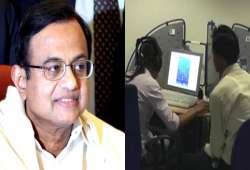Home Ministry Wants To Become Big Brother
New Delhi, Jul 3: The Department of Telecommunications has virtually turned down an unprecedented request from the Ministry of Home Affairs (MHA) and the Intelligence Bureau to help intercept a sweeping range of encrypted communications

New Delhi, Jul 3: The Department of Telecommunications has virtually turned down an unprecedented request from the Ministry of Home Affairs (MHA) and the Intelligence Bureau to help intercept a sweeping range of encrypted communications taking place through mobile phones and the Internet, reports Indian Express.
In February this year, the Home Ministry sent to the DoT a list of 14 services for its grand interception plan which included hush mail, Skype, Gmail, push mail (Windows), video chats over the Internet, Nokia intellisync wireless email and Motorola messaging.
The Home Ministry asked for all encrypted communication — of individuals as well as of enterprises — to be made available in “readable, printable and audible” format.
And if “no solution” was found for lawful interception of such encrypted communication, the Home Ministry said, the services listed should either be banned or blocked.After a series of meetings, the DoT last month prepared a secret 22-page response to the MHA in which it analysed the pitfalls of such drastic action.
The note, available with The Indian Express, suggests that instead of contemplating drastic action like banning or blocking, intelligence agencies should build their own capabilities of decrypting intercepted communications.
The DoT has argued that interception of communication is only one of the ways of gathering information. And that, in the future, more and more Internet communication is likely to be secured with dynamic encryption without which “the Internet economy” will not develop.
The security wing of the DoT has discussed the impact of a ban on business and industry, e-commerce, e-governance, e-health, passport services and so on. “Banning or blocking of services without providing an alternative may have international reaction and could affect other industries like BPO and IT outsourcing.”
The department's argument: “...any country imposing artificial restriction is going to be left behind in development. Development itself provides security at a much different level, hence, direct security by means such as banning encrypted communication or indirect security by a developed and powerful nation needs to be weighed.”
The DoT has recommended that encrypted Internet services should instead be regulated so as to balance the security assistance needs with communication security needs.
It has suggested that security agencies should develop cryptographic capabilities to read encrypted communications which is “practically possible” and that, for instance, the NTRO (National Technical Research Organisation) with the help of other software companies, should develop an interception tool.